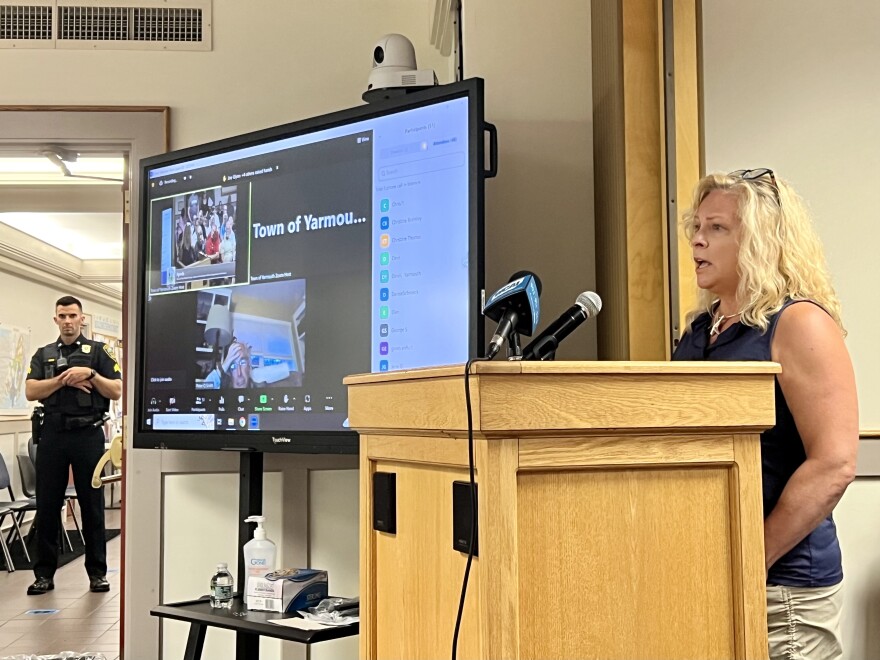Yarmouth residents packed a Board of Selectmen meeting last night to denounce the Healey administration’s placement of migrant families at a local motel.
Virtually everyone who went to the podium registered opposition. Some talked about national immigration politics. Others, like Daniel Cavanaugh, expressed concern about possible costs to the Dennis-Yarmouth School District.
“What effect is this going to have specifically on the D-Y school system, in terms of a head count?” he said. “Whatever that number is, how soon can that number be ascertained? And how would that factor into the D-Y budget?”
The discussion became contentious at times. At the direction of Chairman Michael Stone, one woman was ejected by police after repeatedly speaking out of turn.
Stone said he wanted to make it clear that the town was not collaborating with Gov. Maura Healey’s office on the placement of migrants in Yarmouth. The arrangements are between motel owners and the state, he said.
The state did not ask for the town’s input, and town officials are frustrated with the lack of communication from the state, selectmen said.
“It's obvious to us that not only is the communication poor, but the planning is poor,” said Selectman Mark Forest. “And we're certainly not the only community that is in this situation.”

In addition to concerns about educational costs, members of the public decried the idea of spending taxpayer money on other services to migrants.
Several voiced fears that migrants who have only been in the country a few days could be carrying undetected infectious disease — an assertion that prompted a reply from Town Administrator Bob Whritenour. He said the state has a rapid-response medical team conducting health screenings at the Harborside Suites, where the state sent several migrant families.
Outside the motel yesterday, a migrant couple and their two children were sitting at a picnic table.
Wilny Fred Gaudin said his family is originally from Haiti. After living in Chile for the past seven years, they came to the United States for a better life.
“Seven years, we realized nothing,” said Gaudin, who speaks some English in addition to Haitian Creole, French, and Spanish. “We was victim of discrimination.”
He said his four-year-old son wasn’t getting the support he needed in school. “That's why we want to go to USA, to find for him a better school.”
Gaudin said he’s a qualified bus driver, and his wife worked at a call center handling airline ticket purchases. They have hope, he said, that they will find jobs and a stable place to live.
At the selectmen’s meeting, officials sought to dispel the misperception among some in the audience that Martha’s Vineyard had “kicked out” a group of migrants sent by Florida Gov. Ron DeSantis last year. Then-governor Charlie Baker’s administration decided to move the migrants, on a voluntary basis, to Joint Base Cape Cod so they could access services more easily.
“I don’t want to lose sight of the fact that we’re talking about people here,” Selectman Daniel Horgan said in his opening remarks. ”I'm trying to balance all of the needs and be as open to your questions and concerns as I can be, so that we can make the best decisions possible. But please remember that we’re talking about people.”

During the meeting, some in the audience called out “send them back” and similar comments rejecting the idea of hosting migrants. One person said the town should send the migrants to the State House.
Resident Diane Elliot asked the chairman if protesters would be within their legal rights to form a human chain at the Bourne and Sagamore bridges to block buses of migrants.
Stone said such action would be civil disobedience, for which participants would pay a price.
But he said he appreciates what the protesters — about 40 of whom demonstrated outside Town Hall — have been doing.
“You certainly have the right to do that under the First Amendment,” he said. “I applaud your efforts. I know it takes time; I know it takes dedication, organization. And I certainly am in full support of that.”
The Board of Selectmen voted to send a letter to the state objecting to a plan to send migrants to the Yarmouth Resort. Board members indicated they would likely draft a similar letter speaking more broadly to the placement of migrants in Yarmouth.
A town zoning bylaw limits motel stays to 30 days. Officials said the town is researching whether Healey’s emergency declaration can supersede local zoning.
Last month, the Massachusetts Department of Elementary and Secondary Education issued guidance to school systems following Healey’s declaration of a state of emergency over migration.
The agency said the state supplemental budget provides reimbursements to school districts for homeless students at a rate of $104 per student per day, the equivalent $18,000 annually for each eligible student.







